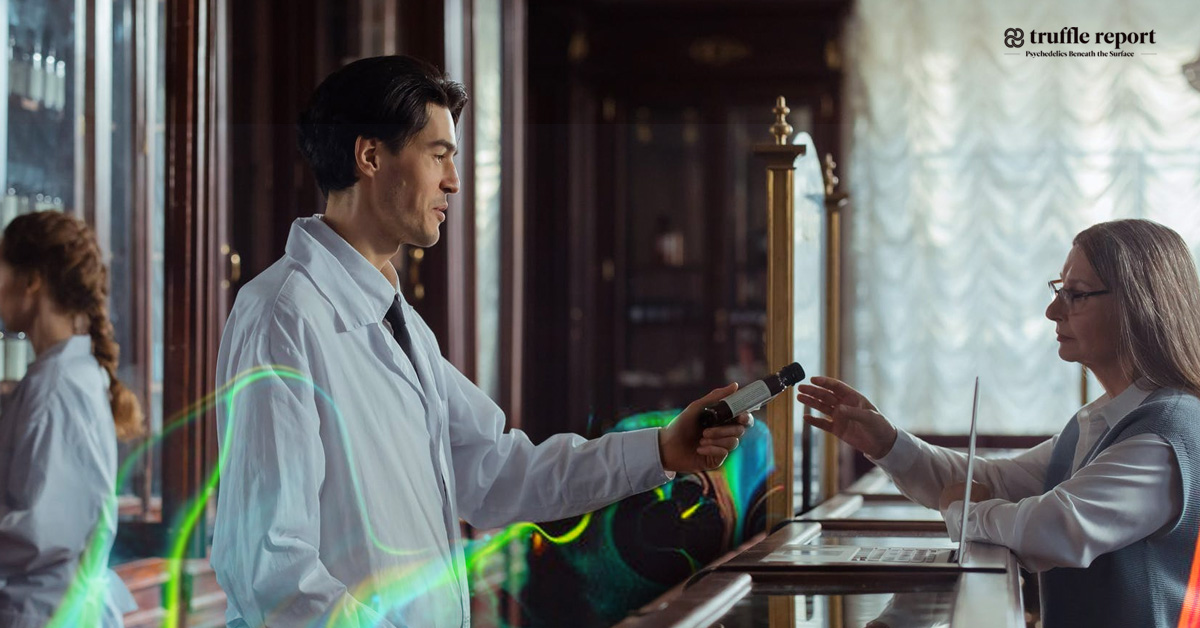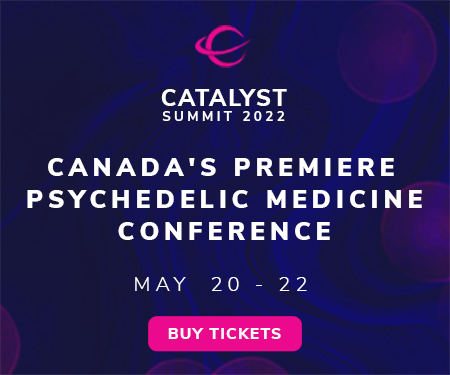Pharmacists are the most accessible healthcare professionals to the general public. In the event of FDA approval of psychedelic medicine for anxiety, depression, PTSD and other psychiatric indications, pharmacists will play a pivotal role in the implementation of psychedelics in healthcare.
In our first attempt to cover the role of pharmacists in the evolving field of psychedelics, a few of our readers expressed an understandable skepticism as to the willingness of these professionals to take the risk of commenting on these issues in their day-to-day practice. Truffle Report reached out to Kevin Lanzo, Regina Moore, Sa’ed Al-Olimat, Emily Kulpa and Michael Haichin, Co-Founders of the Psychedelic Pharmacists Association (PPA), and Kelan Thomas, Board-Certified Psychiatric Pharmacist and Associate Professor of Clinical Sciences at Touro University California College of Pharmacy and advisor to the PPA, to find how pharmacists can address concerns about accessibility, safety, and equity around psychedelics in healthcare to their patients.
“Pharmacy is by and large a traditionally ‘conservative’ profession,” Moore tells Truffle. “Psychedelics are still illegal substances and for most pharmacists, there are serious ethical concerns about being seen to endorse the use of anything illegal. This problem is at the root of harm reduction services around needles as well,” she explains.
“A pharmacist may choose to not dispense a needle to a patient that they suspect might immediately walk to the pharmacy bathroom, inject heroin, and overdose. These are real stories witnessed in pharmacies, and it takes a great deal of empathy to balance out the fear of patient harm and the duty to prioritize patient safety, autonomy, and public health,” says Al-Olimat.
“Pharmacists primarily support the safe and effective use of prescription medications and over-the-counter products in their pharmacy,” says Thomas. “The primary reason why pharmacists still haven’t come out in support of these drugs is simply that there are no products currently available.”
“Compassionate, informed conversations around psychedelics involve even more grey area, as it’s not as simple as providing a legal product, like a needle. Though it makes many of us professionally uncomfortable, we are allowed to disagree with current laws and rules and work to change perceptions, which is the first step in changing laws,” adds Moore.
Psychedelics in Healthcare: Filling the Gap in Psychedelic Education
According to the co-founders of the PPA, many pharmacists who have evaluated the literature, safety profile, and patient testimonials want to come out in support of psychedelics in healthcare, but are fearful of being associated with the rhetoric due to the possibility of repercussions by employers. They also fear jeopardizing their licenses, often issued by bodies with that aforementioned conservative bias, if they speak out and violate real or imagined policies.
“If we are interested in promoting accessibility and equity, then community pharmacies should play an integral part in this conversation. However, we need to shift away from our current community pharmacy/healthcare model that can be quite ineffective for preventing and treating mental health conditions, and envision a new model more effective for supporting psychedelic programs,” says Al-Olimat.
“As Doctors of Pharmacy who receive as much classroom clinical education as Medical Doctors, we need to redefine the primary role of a community pharmacist and shift from primarily dispensing medications to being extensions of primary care and mental health care as consultants and educators. Pharmacists have a broad scope of practice in many states, some of which include prescribing medications, changing doses, discontinuing medications, medication counseling, and motivational interviewing,” adds Kulpa.
Haichin explains, “It takes the efforts of organizations and systemic educational initiatives to educate a profession about a new type of therapy. By utilizing both traditional methods as well as new platforms and technologies, information can be disseminated to the community. Continuing education programs are tried and true, while virtual conferences and panel discussions are relatively new ways to receive professional education. The ultimate goal will be to get psychedelic education into pharmacy and medical school curriculums. The Psychedelic Pharmacists Association seeks to meet the educational needs of all members of the profession.”
“We see this education about psychedelic therapies as essential to the future of our profession,” he adds.
What Can Pharmacists Legally Tell Their Patients?
Trying to incorporate psychedelics in healthcare is a risk. Admitting the use of any illicit substance, or even the misuse of a prescription drug is always an exercise in trust. However, according to Haichin , pharmacists are drug experts that can inform patients about how psychedelics work, where they come from and their history, how they interact with other medications, and ways to reduce the risks of negative reactions.
Lanzo continues, “Harm reduction counseling is legally distinct from advocating any illegal use and has major benefits for building trust between patients and caregivers. Pharmacists can also advise patients on safe practices for tapering antidepressants, in the event that they are wanting to do so before a psychedelic therapy session. Moreover, well-networked pharmacists are able to triage and direct patients to other practitioners operating above-board — like ketamine clinics. The opportunity for pharmacists to function as a critical node in a psychiatric network of care will expand even more once other psychedelics like MDMA and psilocybin are FDA-approved.”
Moore explains “Patients should try to keep some perspective of the situation and know that pharmacists do want to help. Most pharmacists also feel very strongly about doing no harm, and that includes recognizing and helping to support addiction prevention and recovery. If you are suffering, have an honest conversation with the pharmacist about it. More often than not, they would like to help you find a way out if you would like to help yourself.
Al-Olimat says, “If a patient feels uncomfortable or stigmatized, they can find a new pharmacy or try to develop a positive relationship with a helpful pharmacist.”
Psychedelics in Healthcare: How Pharmacists Can Support the Promise of Psychedelics
According to Thomas, pharmacists can decrease stigma around the use of psychotropic drugs by engaging in local policy initiatives and learning more about psychedelics in healthcare.
“Start educating yourself by reading references from the Psychedelic Pharmacists Association, along with attending seminars and lectures,” says Thomas.
The PPA co-founders stress that it is important to speak up and advocate.
“Even if one is not able or willing to speak individually when groups like the PPA can approach stakeholders and legislators and let them know how many pharmacists support psychedelic medicines. By the show of members, there is the power to influence opinions. Having these conversations in everyday life with colleagues can also have more of an impact than you expect. Let people know how you feel. Have journal clubs or book clubs with small groups. Education is the fastest way to decrease stigma. Have a conversation that inspires someone else to have a conversation… let the fire spread!” Moore explains.
When asked for recommendations on how pharmacists can get involved in psychedelic research, the PPA co-founders had some suggestions.
“Join the Psychedelic Pharmacists Association, and pay attention to the research by following reputable sources (like the Truffle Report, Report on Psychedelics, Blossom, Lucid News, etc),” says Lanzo.
“Tell your local Board of Pharmacy, and any professional associations you already belong to that you want to learn more about psychedelic-assisted therapy,” follows Kulpa.
“Find your local psychedelic club or psychedelic society and get involved in the community discussion — they are more common than you’d think, and they value the critical insights a pharmacist brings to the discussion. The field is still a small, but growing community and research opportunities may present in the most interesting places,” adds Al-Olimat.
“The role for pharmacists in future psychedelic treatment clinics has yet to be determined, but there are many reasons to believe we have an essential role to play as medication specialists,” Lanzo concludes.

















